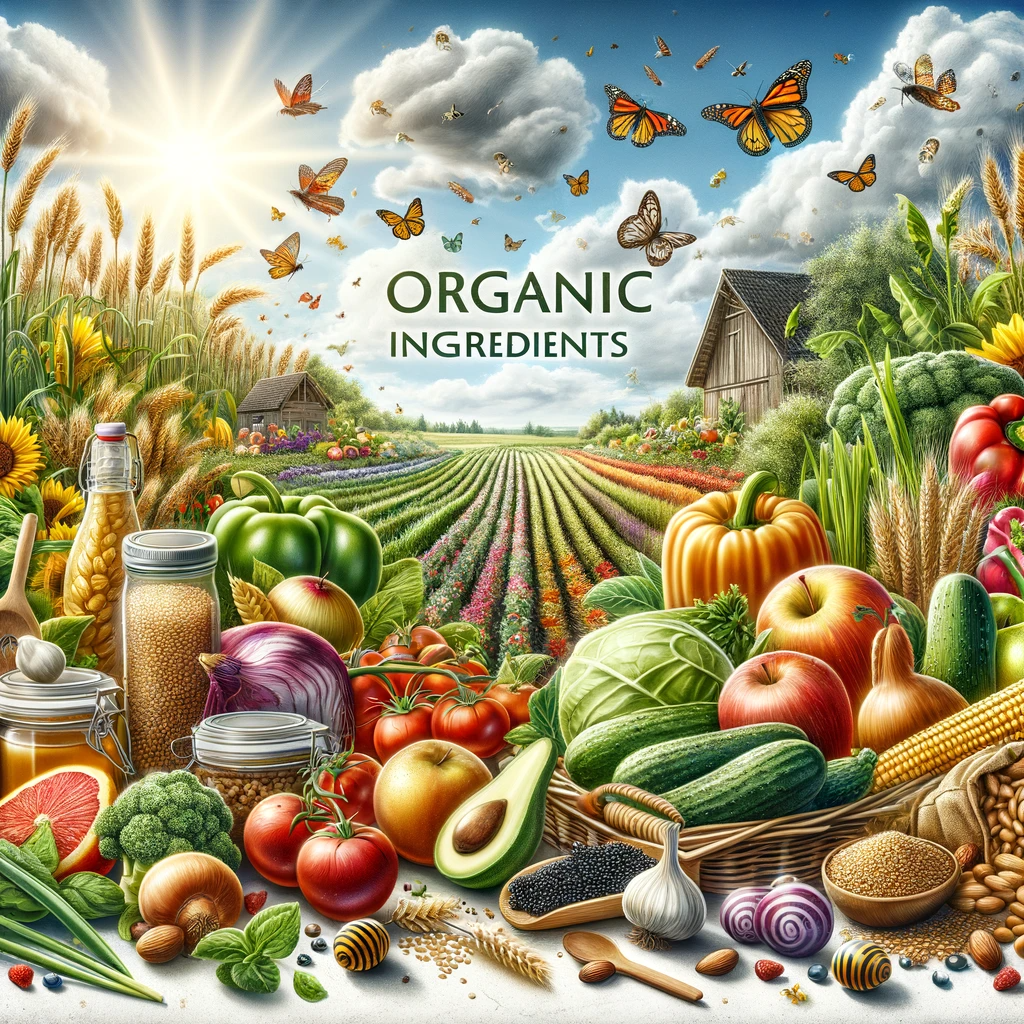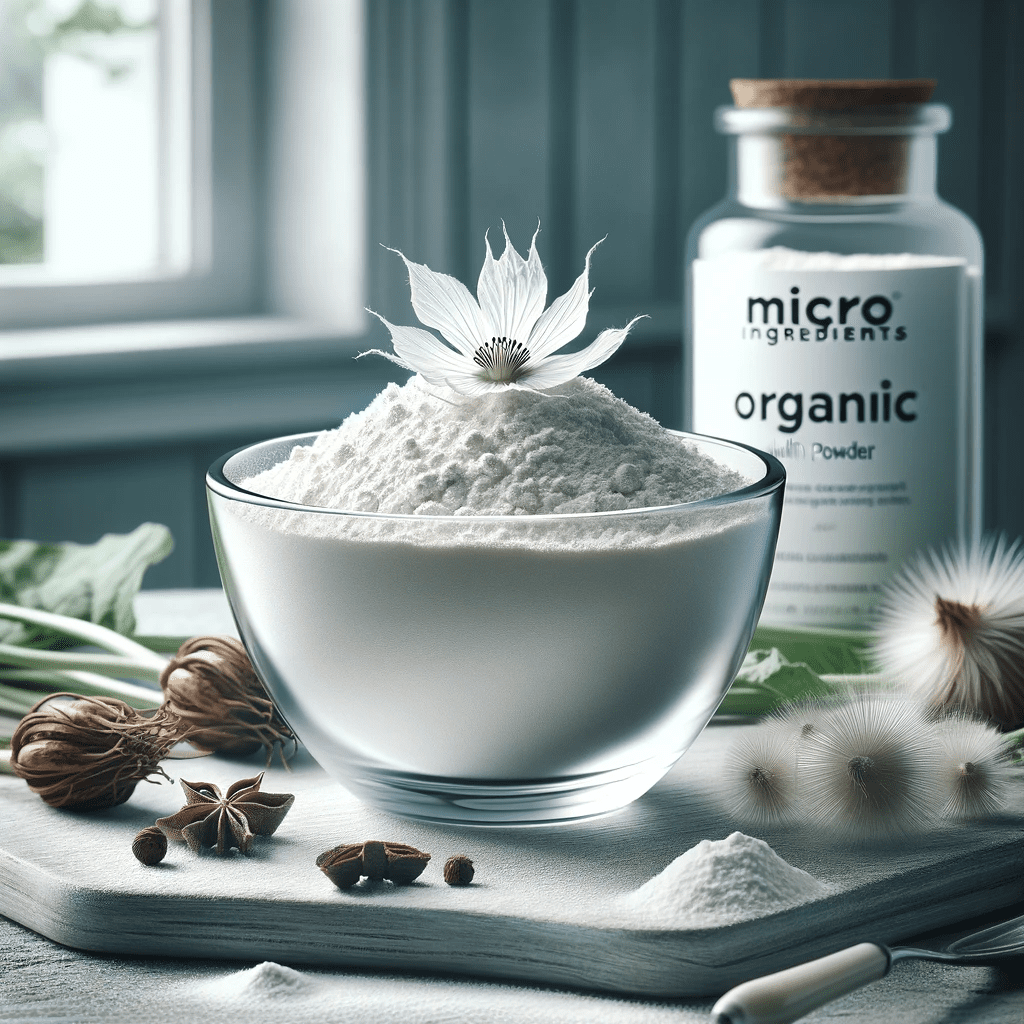Definition
Organic ingredients are ingredients from living organisms, grown free from artificial chemicals, pesticides, or genetically engineered organisms, and adhering to strict organic farming standards.
Expanded Explanation
Organic ingredients refer to cultivated produce without synthetic pesticides or fertilizers. They come from farming practices that prioritize environmental health. Many substances are obtained from natural sources, meaning that only a few chemicals are used in the process. Additionally, organic farming methods support sustainable land use and biodiversity. Consequently, organic produce typically avoids genetic modification and irradiation.
This approach ensures the preservation of natural qualities in food. As a result, organic products are often considered healthier and safer. Moreover, organic agriculture reduces harmful environmental impacts. Thus, these practices contribute to cleaner soil and water. Organic ingredients reflect a commitment to natural, eco-friendly agricultural methods.
Benefits of Organic Ingredients
Organic ingredients offer numerous health benefits due to the absence of harmful chemicals. They are grown without synthetic pesticides, enhancing their natural purity. This method of cultivation preserves the nutritional value of the food. Moreover, organic farming supports environmental sustainability, promoting healthier ecosystems. As a result, these ingredients often have a richer, more authentic flavour.
They also help to minimize the chances of being exposed to substances that could be potentially dangerous. This aspect is particularly beneficial for maintaining long-term health.Furthermore, organic agriculture helps in conserving biodiversity and protecting wildlife. Therefore, choosing organically sourced food contributes to a cleaner, safer environment. Using organic ingredients supports overall well-being and ecological balance.
Environmental Impact
Organic ingredients positively impact the environment by promoting sustainable farming practices. They require the use of natural fertilizers, reducing chemical runoff. This method helps preserve the soil’s fertility and health in the long run. Additionally, organic farming conserves water, a vital natural resource. It also encourages biodiversity by supporting various plant and animal species. Significantly, these methods reduce pollution, contributing to cleaner air and water.
Moreover, organic agriculture limits the use of energy-intensive synthetic chemicals. This reduction in energy consumption aids in lowering greenhouse gas emissions. Consequently, organic farming plays a role in combating climate change. Overall, organic ingredients signify a commitment to environmental preservation and sustainability.
Examples
Example 1: Organic ingredients in cooking enhance flavour without artificial additives, offering a healthier dining experience. They also reduce exposure to harmful pesticides, promoting overall well-being. Additionally, using these ingredients supports sustainable agriculture, helping to conserve natural resources.
Example 2: In skincare, organically sourced components ensure products are free from harsh chemicals, benefiting sensitive skin. Furthermore, they often contain higher levels of antioxidants, aiding skin rejuvenation.
Related Terms
Natural Ingredients: Natural ingredients derived from plants, animals, or minerals actively used in a variety of products like skincare, cosmetics, and food. Recently, they have gained popularity as more people seek products with fewer synthetic components and potential irritants. These ingredients are celebrated for their unique properties and perceived benefits to the skin, hair, and overall health.
Eco-friendly: Eco-friendly products and practices are designed to support the planet’s well-being and minimize negative environmental impacts. This concept is increasingly significant across various industries as consumers grow more aware of their ecological footprints. Notably, eco-friendly products often incorporate sustainably sourced ingredients like organic or fair-trade elements, which help reduce the environmental impact typically associated with conventional farming methods.
Visual and Product Aids
External Resources
USDA National Organic Program: The USDA National Organic Program (NOP) functions as a federal regulatory body, setting and applying uniform standards for organic products in the U.S. This program ensures that agricultural products meet established organic criteria, promoting consistent quality and safety. This program is crucial in certifying farms and businesses that adhere to these national standards. The NOP partners with independent organizations to ensure producers comply with these standards. This collaboration upholds fairness in production and bolsters consumer trust in the USDA Organic Seal.
Organic Materials Review Institute (OMRI): The Organic Materials Review Institute (OMRI) plays a vital role in supporting organic integrity. It offers clear information and guidance on materials, aiding producers in identifying products suitable for organic operations. As a 501(c)(3) nonprofit, OMRI independently evaluates various products such as fertilizers, pest controls, and livestock health care items. This process guarantees that these products adhere to the required standards for organic certification.
Related Articles
The Great Debate: Are Organic Foods Healthier Than Conventional Ones? The post explores the health benefits of organic foods compared to conventional ones. It delves into various studies and perspectives, examining nutritional content, environmental impact, and safety standards. The article also addresses common myths about organic foods, providing a comprehensive view.
10 Benefits of Organic Food: The Ultimate Wellness Guide: The post “10 Benefits of Organic Food: The Ultimate Wellness Guide” on Sunny Days Go highlights organic foods’ health and environmental advantages. It emphasizes the reduced exposure to harmful pesticides and the higher nutrient levels in organic produce, supporting overall health. Additionally, the guide covers the positive environmental impact of organic farming, such as reduced pollution, enhanced soil health, and biodiversity conservation. These benefits collectively contribute to a sustainable and healthier lifestyle.


